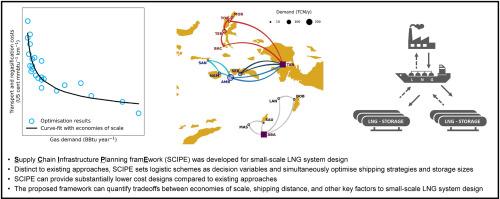An MILP framework for gas supply chain infrastructure planning with endogenous logistics schemes
IF 5.5
0 ENERGY & FUELS
引用次数: 0
Abstract
This paper presents a mixed-integer linear programming (MILP) framework to minimise the costs of gas supply chains. Distinct from existing approaches in the literature, which often rely on pre-defined logistics schemes and treat storage sizing at receiving terminals in isolation, this framework integrates these into a single optimisation model. By setting these elements as decision variables, the framework allows for simultaneous optimisation of shipping strategies and receiving terminals design. Here, the liquefied natural gas (LNG) supply chain in Indonesia's Maluku Islands was used as a case study. Additionally, the framework was applied to the Finnish coastline and the Caribbean Islands, which differ substantially in terms of demand levels, distances between locations, and geographical contexts, to demonstrate its applicability to problems with differing characteristics. The results show that clustering demands to increase project sizes can lead to significant cost reductions. However, the marginal gains of these economies of scale diminish rapidly as project size grows, especially with longer shipping distances. Finally, the proposed framework was also shown to provide substantially lower-cost solutions compared to methods that rely on pre-determined shipping strategies or optimise shipping and storage capacities separately.

具有内生物流方案的天然气供应链基础设施规划的MILP框架
本文提出了一个混合整数线性规划(MILP)框架,以最小化天然气供应链的成本。与文献中现有的方法不同,这些方法通常依赖于预定义的物流方案,并孤立地处理接收终端的存储规模,该框架将这些集成到一个单一的优化模型中。通过将这些元素设置为决策变量,该框架允许同时优化运输策略和接收终端设计。本文以印尼马鲁古群岛的液化天然气(LNG)供应链为例进行了研究。此外,该框架还适用于芬兰海岸线和加勒比岛屿,这两个岛屿在需求水平、地点之间的距离和地理环境方面差别很大,以表明它适用于具有不同特点的问题。结果表明,增加项目规模的集群需求可以显著降低成本。然而,随着项目规模的扩大,尤其是运输距离的延长,这些规模经济的边际收益会迅速减少。最后,与依赖于预先确定的运输策略或分别优化运输和存储容量的方法相比,所提出的框架还显示出提供了成本低得多的解决方案。
本文章由计算机程序翻译,如有差异,请以英文原文为准。
求助全文
约1分钟内获得全文
求助全文

 求助内容:
求助内容: 应助结果提醒方式:
应助结果提醒方式:


